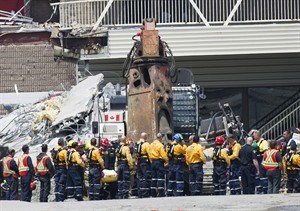
Rescue workers remove their hard hats as firefighters carry a second body out of the Algo Centre Mall in Elliot Lake, Ont., on Wednesday, June 27, 2012, after the mall's roof collapse last Saturday. THE CANADIAN PRESS/Nathan Denette
June 27, 2012 - 7:53 PM
TORONTO - The rescue mounted in the mall collapse in Elliot Lake, Ont., went at the pace it did to ensure those trapped inside were given every chance for survival, suggests a disaster management expert.
"It may seem slow to us but this isn't a Hollywood movie," said Ann Wyganowski, vice-president of the Toronto-based HZX Business Continuity Planning.
"This is for real."
After the Algo Centre Mall caved in Saturday afternoon, it took four days for Toronto's Heavy Urban Search and Rescue team to recover two bodies from the rubble. A heavy-duty crane used to remove a toppled escalator inside the building arrived late Tuesday to assist the team.
Officials don't believe any more people are inside the two-storey building.
Wyganowski said the 37-member search and rescue team is trained to deal with these types of disasters even though the public may have felt the rescue had lagged.
There are five of these specialized units across the country, including Vancouver, Calgary, Halifax and Manitoba.
The teams are deployed to large-scale rescue operations, including everything from structural collapses, like the one in Elliot Lake, to chemical spills.
She said anyone trapped inside the mall would have been endangered if the rescue was sped up unnecessarily.
"If they do it wrong and somebody is still alive, they could kill them," said Wyganowski, likening the current response in Elliot Lake to that of the Haiti earthquake and the Chilean miners' rescue in 2010.
"It is very difficult and tricky in these types of situations when there are a lot of things you don't know," she said.
The safety of the rescuers was also a concern in Elliot Lake. Operations temporarily ceased Monday after officials deemed the structure too unsafe to enter but were restarted after Ontario Premier Dalton McGuinty intervened.
Scot Phelps, who was a paramedic during the 9/11 terrorist attacks, suggests a slow pace should not be seen as a bad thing.
If the operation is quickened, it may mean it has shifted to a recovery mission.
"Going slow is almost a hallmark of a rescue," said Phelps, who now teaches at the Emergency Management Academy in New York.
"Really, you do have some degree of time to get (survivors) out. You don't want to rush through it."
He has no doubt the public's frustration with the rescue is also being felt by those on the rescue team.
"This is extraordinarily stressful for the rescuers. The last thing they want to do is stop and wait," he said.
"They desperately want to get in there to help."
News from © The Canadian Press, 2012